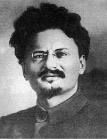
LEON TROTSKY
1879-1940
Leon Trotsky was born November 7, 1879, the fifth child in a Russian Jewish family, of wealthy (but illiterate) farmers. Leon Trotsky went on to become a Russian revolutionary, Marxist theorist, and Soviet and Communist leader. He was born Lev Davidovich Bronstein but changed his name to Leon Trotsky when he was 23.
As a child, Trotsky grew up speaking Russian and Ukrainian. At age nine, he was sent to a Jewish school in Odessa, which he ran away from a few months later. Educated in a secular Russian school, became proficient in German, English, French and Spanish. In 1896, Trotsky moved to Mykolaiv, where he became involved in revolutionary activities with the Mykolaiv Populists.
Although at first he was opposed to Marxism, he soon became a strong proponent and helped organize the Southern Russian Workers Union, which led to his arrest and by the Tsarist police and eventual exile to Siberia. During this time, he married a fellow Marxist, Aleksandra Sokolovskaya. Their two daughters were born in Siberia. Although Trotsky and his wife separated, they remained on good terms until 1935, when Sokolovskaya disappeared during the Great Purges.
In 1902, Trotsky escaped from Siberia and fled to England, under the assumed name of one of his jailors, Leon Trotsky. In London, he joined Lenin, L. Martov, Georgy Plekhanov and other Russian Social-Democrats and became a writer for their organ paper, Iskra (The Spark). Differences within the party led him to become an independent socialist and to formulate his theory of “permanent revolution.” In 1903, Trotsky married Natalia Sedova, and they had two sons (Leon Sedev and Sergei Sedov).
At the outbreak of the 1905 Revolution, Trotsky returned to Russia to become a leader of the revolutionary workers’ council in Petersburg. He was arrested and exiled again to Siberia, escaping a second time in 1907. He spent the next ten years in exile, where he propagated his ideas as a revolutionary journalist. When the March Revolution of 1917 broke out, Trotsky returned from New York to Russia. He soon joined up with Lenin and was elected to the Central Committee of the Bolshevik party.
Trotsky led the Bolshevik forces in overthrowing the existing government. With the Bolshevik victory in the 1917 revolution, Trotsky became second in power, after Lenin. From 1917-1918, he held the position of Commissar for Foreign Affairs. In 1918, Trotsky resigned this post and was appointed People’s Commissar of Army and Navy Affairs. During the course of the civil war (1918-1920), Trotsky transformed the Red Army into a centralized, powerful military organization, thus securing the Bolshevik’s victory
Trotsky was far removed from any Jewish religious life. When the leader of The Bund asked him – “Trotsky, tell us, are you a Russian or a Jew?” Trotsky replied with full sincerity, “I am neither a Russian nor a Jew, I am a Social Democrat – I am an Internationalist.”